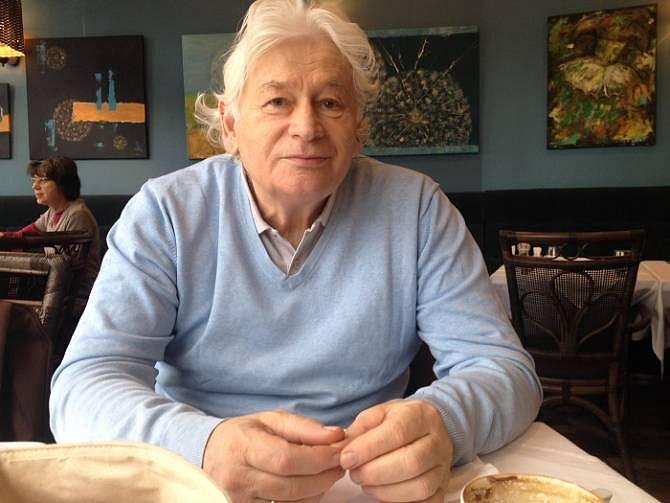Werner Stein: Growth. Growth. Growth. Do we really need that?

Businessman, professor and spirituality-seeker Werner Stein challenges conventional business wisdom and takes us on a Sunday trip to past lives and the philosophy that should guide business.
A man with white hair slowly eats his breakfast at a newly open restaurant in Bucharest. He’s wearing a light blue sweater over a white shirt and his colour choice seem to match the surroundings: the blue walls of the room, the white table cloth and the white cup of coffee.
The man is Werner Stein, chairman & founder of the consulting group Stein & Partner. He’s also one of the founders of the German Chamber of Commerce and a former manager for Romania with the “SOS Children’s Villages” International NGO.
As I arrive at the restaurant and sit at the table, Werner first notices my phone carcase, resembling a Batman. “It looks like an angel with wings,” he says laughing, with a strong German accent.
Then after a few sips of coffee, some bites of food and a short introduction, Werner moves directly to a discussion about growth and values. He clearly doesn’t act like he’s being interviewed, waiting for specific questions and trying to say something interesting. I have in front of me a person who really likes to talk about things. And when it’s a better time to analyze the world around you and chat about it than on a sunny Sunday morning? So, a glass of apple juice for me, a cup of coffee for Mr.Werner and let’s proceed to talks!
“I went to a conference in Milan about two months ago. There were about 60, 70 managers talking about value and growth, how the two go together. Growth, growth, growth, this is what we hear every day, but then is the question, do we need to grow every year as a company; what is growth doing to us? If you look at individuals, the outside growing stops with 18, 19 or 20. But the inside growing never stops.”
“It’s no wonder that so many managers in Germany, Switzerland or Austria are burnt out. The company has a wonderful year, profit in millions. What happens next year? People want to have a 10% increase over that wonderful year. Top managers kill themselves. The pressure is too high. I have a friend with a clinic. He has a long waiting list.”
Werner says that his company has never had a growth target. Instead they are looking for quality points. If people are developing, then the company is also growing. If people are sleepy, the company is also sleepy. First comes the team and then comes the profit, Werner says. If you make it the other way around, you will just put pressure on people.
Werner is a man in his 60s, whose activities have changed a lot over time. He worked as a trainer in a parish in Germany, in an NGO for many years. Then he founded his own company and switched to the private sector, and in the last years he has also taught at the Politehnica University of Bucharest. But how did he think of all this when he was in his 20s? What meaning did growth have back then?
“Of course it was different. I worked as a banker when I was 20-something and I had this target to win 1,000 Deutsche Marks per month,” he says laughing. “Between 20 and 40 money is important. You want to have a car, do that and that, it’s normal. But after 40 it changes, or it should change. You see that the outside doesn’t make you happy. How can 20 cars make you happier than 6 cars?”
People start changing, he goes on. Especially in Germany, there are a lot of young people of 25, 26 who don’t want a career anymore. They discover time, nature, different values. This scenario didn't exist 20 years ago. People wanted a career back then.
The craziest thing Werner has done? Hm...he thinks for a few moments. “I was driving a Porsche when I was around 40.” Every young man wants to drive a strong, beautiful car, he says, but then he immediately adds. “But even this has changed. My son in law doesn’t want a car, for example. And young people are more and more open to car sharing and new solutions.” As for the Porsche, he rode it 8,000, maybe 10,000 km, and then gave it up. “Sometimes the best way to get rid of a crazy phantasy, it’s to actually do it. I bought and then in three years I sold it.”
How about coming to Romania, I ask Werner. Was it a crazy thing like buying a Porsche?
“Well, no. To talk about this, I should tell you a bit about my life philosophy. I believe in reincarnation. And I know I was living at least twice in Romania in my past lives. And then my relatives lived for 300 years in Wroclaw, in Poland. I feel more at home in the east than in the west.”
Listening to a University professor and businessman talking about reincarnation is not something you get to hear every day, especially in an agnostic world like ours. I ask Werner if he has ever received reactions such as “How strange that you believe in reincarnation.” He says that he doesn’t mention it in every talk, but if the discussion gets more profound, he will talk about it. “Because I know it. I was able to experience some of my past lives through a special therapy in India. But it wasn’t like watching TV. It involved feelings. I went back in time and I felt what happened there. The reason you go back is not to watch a show of your own past, but to find answers for today.”
The philosophy of reincarnation is the opposite of ‘you can get away with it’. It makes you more responsible for your actions. “When you think about how much we destroy our world, it may be useful to believe that we are coming back.”
As a professor, you need to teach students to reach their own wisdom, Werner says. “Our education systems are based on acquiring knowledge. But I’ve always told my students. The only thing I do is to help your wisdom come out.” This was mirrored by his experience. In the first session, he had only about 20, 30 people coming to the class, but after the first semester, 60, 70 students attended the seminars. Werner’s approach and ideas appealed to the students.
“Everything is inside us and everything is connected. You cannot cut the trees and say, bullshit, this is not important. They are alive, as well, they give us oxygen and they help us. Everything is life.”
By Diana Mesesan, features writer, diana@romania-insider.com
(photo by Diana Mesesan)











